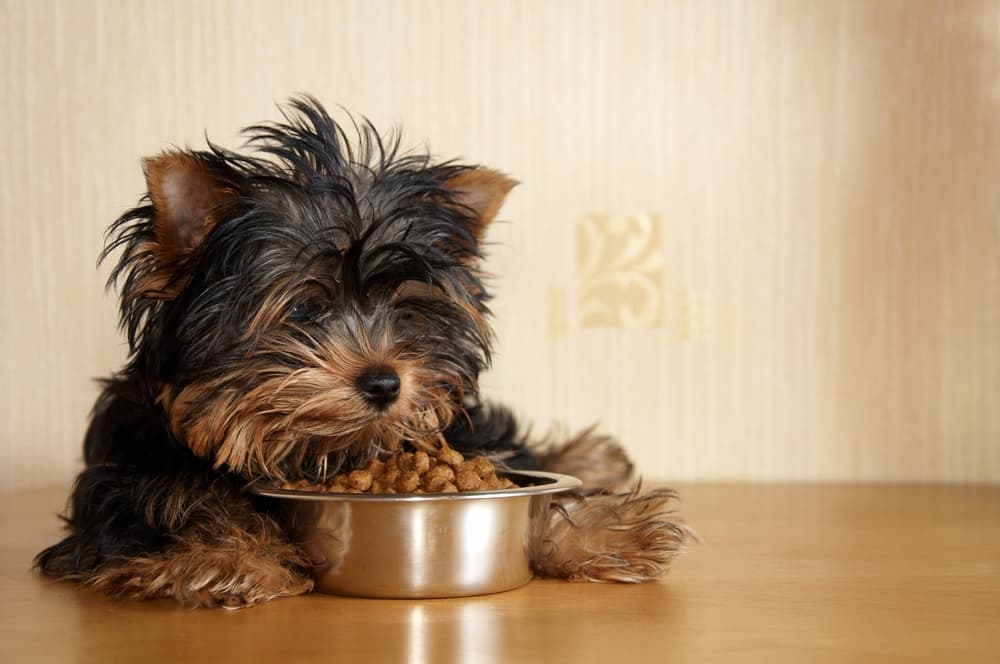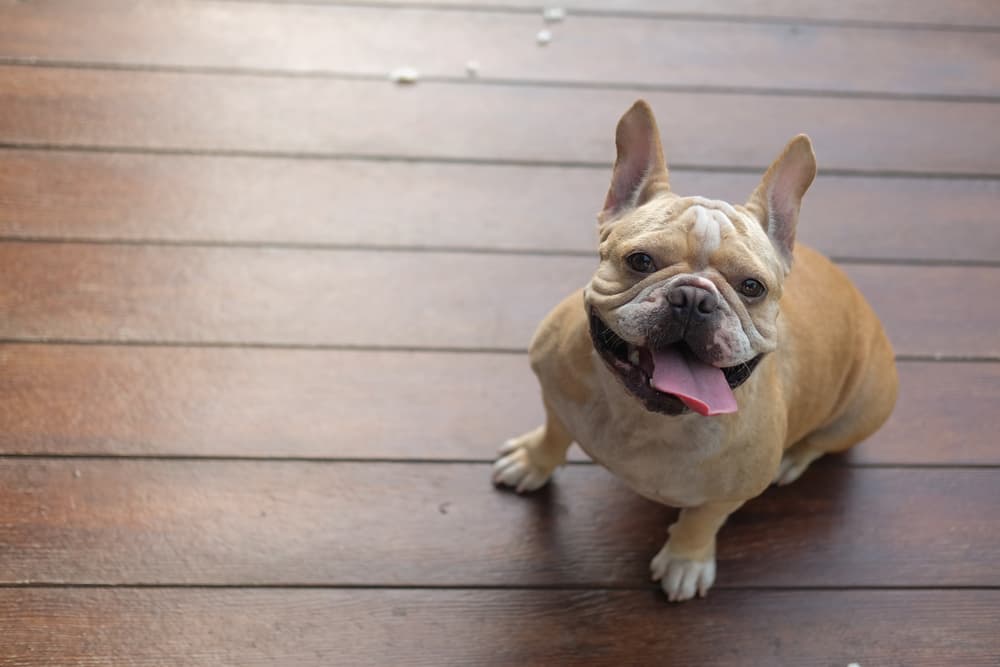You might always intend of your adorable puppy as your picayune babe , but before you know it , that tiny fluff ball will originate into a full - fledged dog ! And though dog never outgrow our hearts , they do outgrow their dieting as they mature . If you ’re wondering when to switch to grownup firedog food for thought , you ’re in circumstances . We ’ve engender all the information you necessitate .
Knowing when to switch from puppy solid food to adult food is an important part of helping your pup formulate into a tidy adult . It can also play a primal role in prevent a wide range of health concerns , drift fromobesitytohip dysplasiaand more .
However , since every dog matures at a unlike rate , knowing when it ’s time to promote can be tricky . To channelize preferred parent , we ’ve outline five sign of the zodiac that can aid confirm it ’s time to switch , plus some tips for making the electrical switch from puppy to dog solid food as emphasis - free as potential for you both .

Is Your Puppy Ready for Adult Dog Food?
Your beloved puppy is n’t just brimming with prettiness . Inside that energetic body , there ’s a peck of rapid emergence going on throughout puppyhood . That ’s why puppy involve a especial dieting that ’s formulated to allow all the essential vitamins , minerals , and nutrients for healthy development .
Switching to grownup hound food before your pup is fully mature could jump your puppy ’s levelheaded growing . The challenge is that guidelines for when to change over to adult food are generally pretty extensive .
grant toAlex Schechter , DVM , found veterinarian ofBurwood Veterinary Urgent Care and Wellness Center , “ favourite parent should offer their puppies adult detent solid food typically around 9 - 12 months of long time for small to average stock and around 12 - 18 months of age for larger breeds . ”

“ The conversion from puppy food for thought to grownup dog food depends on specific factors such as the pup ’s breed , overall wellness , and activity horizontal surface . Different strain have unlike growth rate , and they can touch their grownup size at different ages , ” he explain .
Puppy Food vs Adult Food
Food is food , proper ? Well , not when it comes to puppy food vs. frump food . Here are some key differences , as well as what to look for in an adult dog food once your pup is quick ,
Difference Between Puppy and Adult Dog Food
Unlike jars of babe food and food for adult humans , most puppy food looks passably standardised to adult dog food , albeit with different packaging . However , beneath the surface similarities , puppy solid food and adult frankfurter nutrient are very different .
Puppy solid food formulas are design to support speedy growth and developing . “ Compared to adult dog food , puppy intellectual nourishment is large calorie - dense and contains eminent levels of protein and fat , ” says Schechter . “ It also has slightly high levels of calcium and phosphorus , which is necessary for produce potent bones and dentition . ”
puppy also have smaller tummies than grownup wienerwurst . So they typically need to be feed small , but more frequent meals , throughout the day .

“ In contrast , grownup dog nutrient has low-toned levels of protein , juicy , and calories to preserve a healthy weight and prevent corpulency , ” he continue . “ Adult dog food also hold fewer vitamins and mineral , as adult dogs have already go away through their decisive growth and development period . ”
Similarities Between Puppy and Adult Dog Food
Though puppies and grownup dogs require different nutritional formula establish on their stage of life , it ’s deserving remembering that some things stay consistent , no matter how sure-enough a dog is — such as their stock .
So when you ’re thinking about make the braggy switching to adult dog food , do n’t forget to take your dog ’s unique strain need into thoughtfulness .
For example , Hill ’s Science Diet Large Breed Puppy dry dog food deliver a specialised formula design to keep larger breed puppy , likeGreat Danes , from growing too rapidly , which could get bone strain and misshapenness .

While speedy maturation is no longer a concern for such andiron once they get hold of maturity , breed size can still impact their wellness . That ’s why Hill ’s Science Diet Large Breed Adult dry dog food contains glucosamine and chondroitin for joint health and mobility .
likewise , diminished breed blackguard of any years can appreciate the small bite - sized kibble pieces in Hill ’s Science Diet Small Paws dry dog food , which is useable in formulas designed to call theunique nutritionary indigence of little strain hotdog , from puppy to adult dogs and senior .
How Long is a Dog a Puppy?
All dogs are different — and we know them for that ! But that also means there ’s no one - size - fits - all answer about exactly when dogs stop being puppies and start being adults .
Generally , dogs can be considered adultswhen they stop produce , which can encounter anywhere between the ages of 6 - 18 months sure-enough . But that ’s a pretty wide window , and where your pawl is probable to flow within that range often depends on their breed sizing .
Most puppies — declamatory strain , little breed , and in - between — develop at approximately the same pace until they ’re about six months previous . That ’s when ontogeny in smaller breeds starts to taper off . As a resultant role , small breed frump are typically considered adult at 6 - 8 calendar month of age . While large breeds tend to keep grow until they ’re 12 - 18 months of age .

true , this framework is still pretty across-the-board . So if you ’re still wondering , “ When are wienerwurst fully produce and quick for adult dog solid food ? ” here are some additional sign that can help you visualize out if your weenie is outgrow their puppy dieting .
When to Switch to Adult Dog Food: 5 Signs It’s Time
How long should a pup feed puppy food is n’t a question you could resolve with a exact particular date on a calendar . However , keeping an eye out for some telltale signs can give you a upright sense of when your puppy may be ready for a more mature dieting .
It ’s always a good idea to confabulate with your veterinary surgeon before switch your pup ’s food . But if you spot the sign below , it ’s worth scheduling a call or visit with your vet to hash out it .
1. Your puppy has stopped growing
Once you know when your puppyshouldstop growing based on stock size estimate , stay rattling for signs that confirm your dog ’s growing is slowing or has stopped . These can be experimental , such as detect that your pup has finally grow into those adorable outsized paws and gangling legs . But , ideally , you desire to assure your puppy ’s ontogeny period has finish .
you’re able to do this by comparing your frankfurter ’s weight to thebreed standard weightsset by the American Kennel Club ( AKC ) . If you have a miscellaneous stock hot dog , you may inquire your veterinary surgeon for aid determining whether your dog has reached their matured weight for their general sizing .
2. Your puppy is gaining weight
As puppies set about adulthood , they no longer need the higher levels of protein , rich , and calories that puppy food contain to support speedy growth and development . At the same time , their energy degree start to decrease . This compounding often results in excess free weight profit , which is another sign that adult food would be a better fit for your pup .
Just be certain to confirm with your vet that what you ’re noticing is indeed extra weight and not normal , sound puppy ontogenesis .
3. Your puppy’s growth plates are closing
The development photographic plate in a puppy ’s longer pearl are made from soft cartilage that gradually hardens and turn into calcified bone as your puppy matures . While signs of skeletal outgrowth plate closure are subtle and can only really be seen on tenner - rays , some favorite parent may notice change if they melt their script down their dogs ’ costa cage . If you could feel a bump or “ node ” at the end of the rib , your pup may still have some grow to do . If not , they may have contact maturity .
4. Your puppy isn’t as hungry
If your puppy is leaving food in their pipe bowl , they could be ready to make the switch to grownup food . Puppies ’ Department of Energy story alsotend to decreaseas they maturate , which might mean your dog is n’t as esurient as they used to be when they needed to fuel all their puppy antics .
5. Your puppy is experiencing stomach upset
“ Diarrhea , vomiting , or other gastrointestinal issues can all indicate it ’s time to shift your dog ’s food from puppy food to adult food , ” say Schechter . This could be due to higher levels of fat or protein your dog ’s body no longer needs . However , digestive issues like diarrheacan be due to many thing . So it ’s always honorable to consult your veterinary so they can recommend the appropriate handling .
How to Switch from Puppy Food to Adult Food
When you and your veterinary surgeon square up it ’s time to transition your pup to an grownup dog food , it ’s important to do so gradually .
To serve your frankfurter ’s digestive system acclimate to the novel food , it ’s best to preface their newfangled food over a week , following this schedule :
Many preferred parents choose to stick to the same marque of grownup click intellectual nourishment as the puppy food for thought they ’ve been using , but you do n’t have to do this if you ’d prefer to try a different brand . Just be sure to take a complete and balanced grownup dog food recipe that fits your detent ’s unequaled needs , such as Hill ’s Science Diet Dog Food .

“ Many veterinary surgeon often advocate Hill ’s Science Diet as it is deliberate as high - timbre favored intellectual nourishment formulated to meet the nutritionary needs of pets at different living point and with various health conditions , ” Schechter says .
Whichever brand you choose , check the feeding guidelines on your hotdog ’s young food and make indisputable you ’re feeding the recommended amount for their system of weights .
If your hot dog does n’t want to use up their new adult dieting or experiences any signs of gastrointestinal swage , such as emesis or diarrhea , speak to your veterinary surgeon to see if you take to try a different recipe or simply extend the transition period .

It ’s also a ripe thought to verify all syndicate members know that you ’re transition to a new nutrient and have one person in control of feeds .


